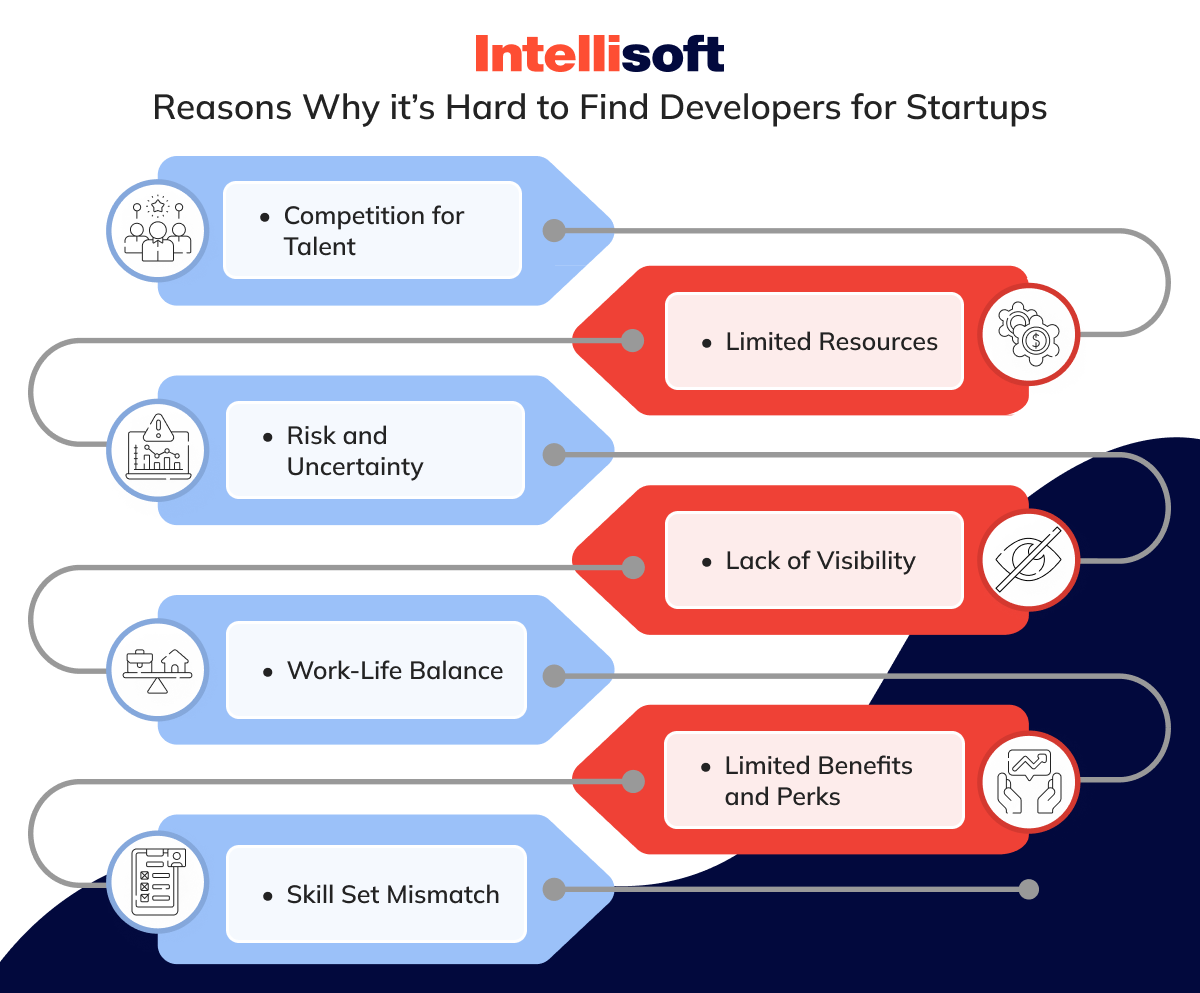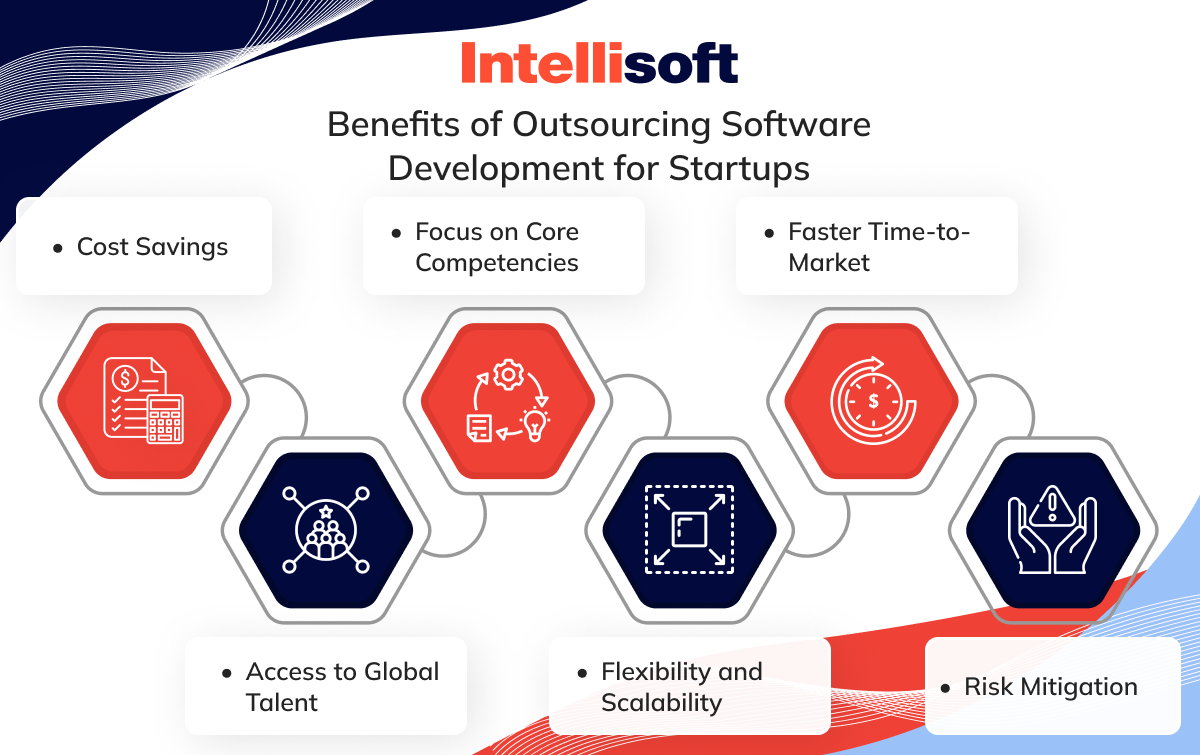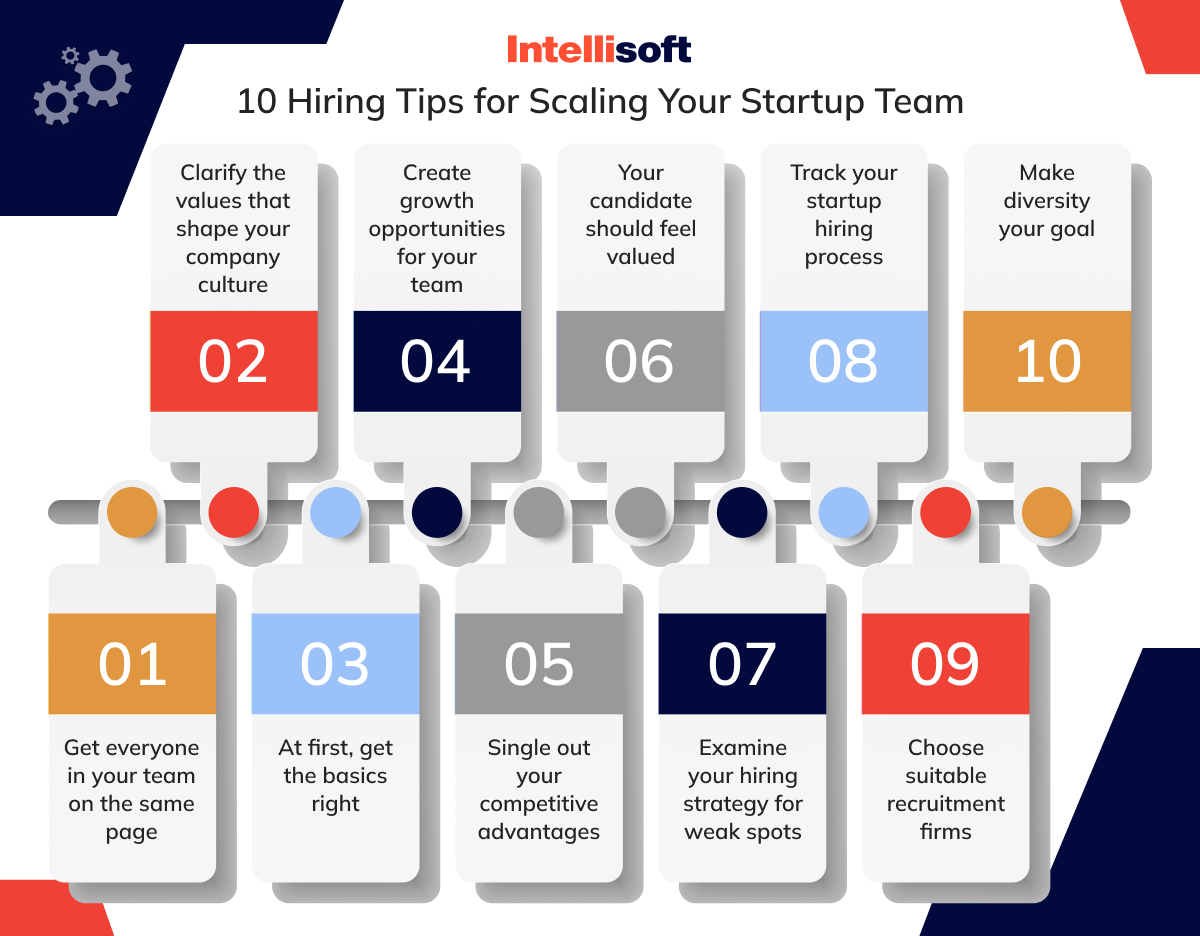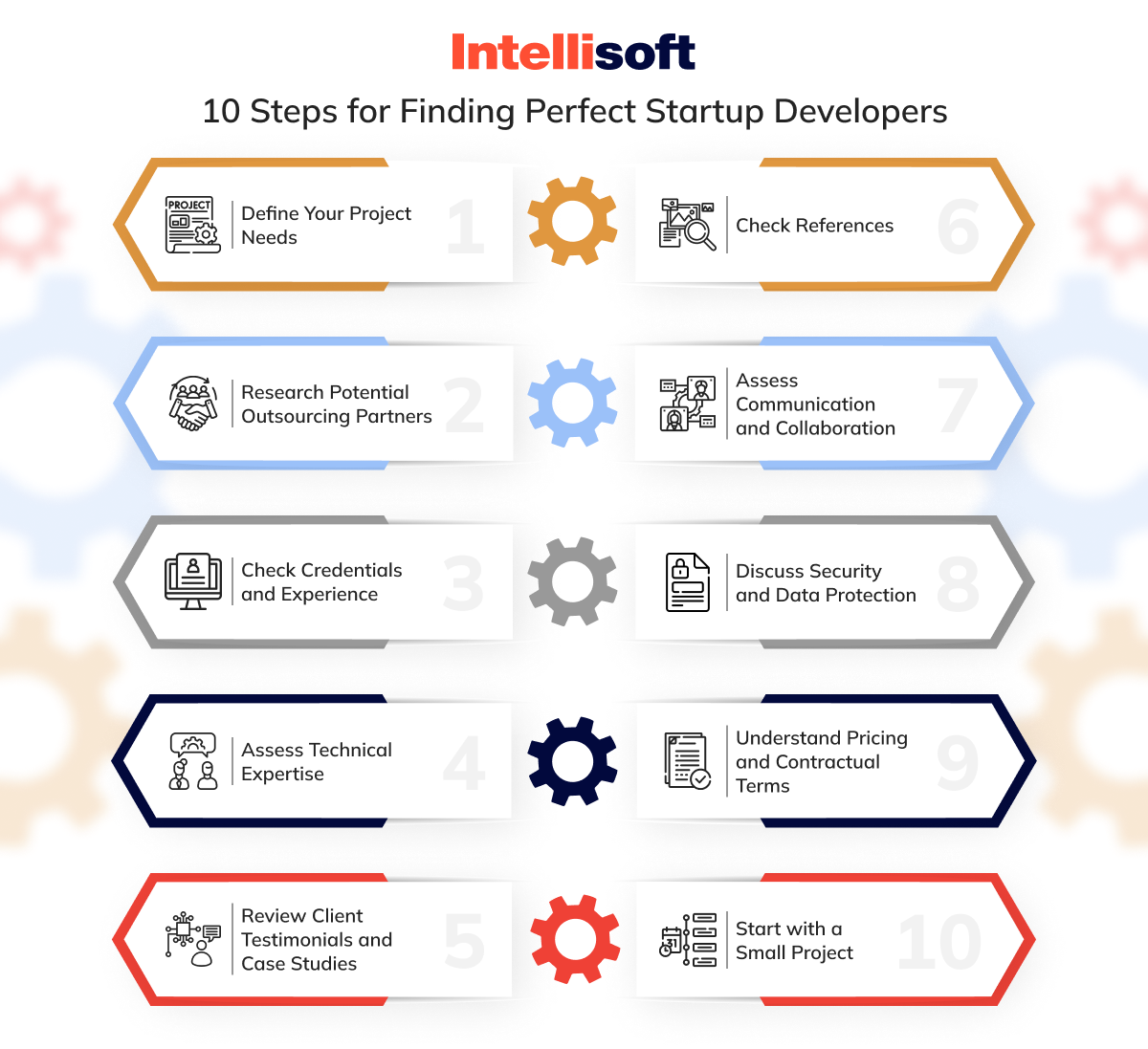When you start your own business, early decisions are always critical. If you’re a tech startup, the importance of recruiting the right developers cannot be overstated. The right team can turn bright ideas into breakthroughs, but the Harvard Business Review highlights a sobering fact: a poor decision of hiring developers for startup can result in costs amounting to 30%–50% of the employee’s salary. This financial burden can be particularly daunting for startups operating on lean budgets.
According to the NFIB, 54% of small businesses face hurdles in locating qualified candidates. IntelliSoft, as a perfect software development company for startups, has been addressing these challenges and actively providing custom software development outsourcing solutions since 2007. Using years of hands-on experience, skill, and a deep understanding of the startup landscape, we can wield a data-driven strategy to sidestep startup hiring challenges. Today, we will talk about possible strategic moves you can make to move towards the triumph of your startup.
Table of Contents
Why is it Hard to Hire Developers for New Startups?
In the fast-paced tech world, finding the right talent is like searching for a diamond in the rough, especially hiring developers for startup, who are as indispensable as they are hard to find. So, what makes snagging these tech geniuses so tricky? Let’s unpack the obstacles you’re likely to encounter when you try to find developers for startup.

The Talent Tug-of-War
Picture this. You’re in a pond, fishing for tech wizards. Here, the big tech firms are like sea giants, armed with irresistible lures: top-notch salaries, brand fame, and fancy perks. For startups, this situation feels like you’re in a David vs. Goliath battle – where Goliath has an enviable arsenal. You might offer the buzz of innovation and the chance to make a real impact, but the tech giants promise stability and fat paychecks. In this intense talent chase, your startup needs more than an attractive proposition – you need a narrative that captivates the best of the best.
The Budget Balancing Act
When it comes to finances, startups often walk a tightrope. Luxuries such as competitive pay and glamorous perks? Usually, it’s not on the cards. You’re up against Goliath, remember? And Goliath’s pockets run deep. Your strengths lie elsewhere: in your vision, your potential to disrupt. But let’s face it – grand visions don’t cover living expenses. The dilemma then becomes: how do you charm top-tier coding talent without a treasure chest?
The Risk Roulette
Joining a startup? It’s like strapping into a blindfolded rollercoaster – thrilling yet filled with unknowns. In contrast, big corporations are more like a predictable, steady carousel. For developers, who often prize job stability as much as their technical skills, betting on a startup can feel like rolling the dice. It’s a choice between the excitement of pioneering and the anxiety of joining a fleeting comet in the tech sky. This risk factor is a major barrier in drawing in those who favor the comfort of established firms.
Under the Radar
If your startup were a novel, it could be the hidden gem in a bookstore overshadowed by bestsellers. In a domain where brand recognition reigns supreme, startups are often the unsung heroes, lacking the limelight their giant counterparts enjoy. Developers, just like avid readers, are drawn to known names synonymous with success and stability. This lack of visibility is another challenge in drawing startup software developers who yearn for the spotlight offered by the big tech names.
The Work-Life Equation
The startup scene is often painted as a world of non-stop action and late-night coding marathons. But here’s the twist: not every developer is looking for a life in the fast lane. Many yearn for a balanced lifestyle, a treasure often buried beneath the demanding nature of startup culture. This image of startups as relentless work hubs can deter those who value their downtime, making it a Herculean task to lure them into the startup world.
The Perks Puzzle
Envision this: Company A is a buffet of benefits – healthcare, retirement plans, gym memberships. Company B, your startup, is scrambling to offer free coffee. In the perks department, startups often find themselves outgunned. These fringe benefits, sometimes overlooked, are magnets for attracting and retaining talent. Without the financial strength to compete, startups must innovate, offering intangibles such as culture and growth opportunities. But let’s be real:in the talent war, these perks are formidable ammunition.
The Skill Set Scavenger Hunt
Now, picture needing a unique, rare ingredient for a special recipe, but it’s almost impossible to find. That’s the scenario for many companies trying to find developers for startup with specific skill sets. The tech world changes rapidly, and keeping pace is a relentless challenge. Startups often need a unique blend of skills, a combination not easily found. This rarity transforms the hiring process into a quest for the elusive – exhilarating yet daunting.
Recruiting developers for a startup is more than filling a position – it’s about finding the perfect piece for a continuously evolving puzzle. As we peel back the layers of this complex task, it’s evident that the obstacles are many, but so are the chances for growth. It’s evident that navigating these challenges is as crucial as turning them into advantages.
What are the Advantages of Outsourcing Software Development for Startups Compared to In-House Hirings?
Your path to success as a tech startup is filled with challenges and critical decisions. One of the key choices to make is deciding between building an in-house team or opting for outsourcing. Outsourcing stands out as a strategic move for resource-conscious startups, offering a host of benefits. Let’s discuss why this approach could be a pivotal decision for your venture.

Saving Costs All-Around
Imagine running a startup where every dollar matters. Outsourcing emerges as a financial savior, particularly when it involves regions with lower labor costs, such as Ukraine. This approach can significantly reduce your expenses, allowing you to access the same talent at a fraction of the cost of local hires.
Then there’s the often-overlooked aspect of infrastructure. Establishing a tech team is more than just hiring programmers for startup – it’s about the physical space and equipment, too. Outsourcing can be compared to having a virtual workspace, eliminating those overhead expenses as your development partner takes care of them.
Tapping into a World of Talent
Outsourcing allows businesses to access specialized knowledge and talent from around the world, some of which may be rare or expensive in your local area. This diversity not only enhances your project but also brings fresh, innovative perspectives. Occasionally, your project might require a specialist with niche skills – a rarity in your local talent pool. Outsourcing grants access to these global experts, ensuring your project doesn’t compromise on technical excellence.
Concentrating on What You Do Best
As a startup founder, you’re likely wearing multiple hats. Outsourcing software development lets you delegate a major chunk of work, allowing you to concentrate on your core business activities – such as steering your company’s vision. Time is a precious commodity in the startup world. Outsourcing makes it easier to hire programmers for startup needs and frees up your internal resources, allowing them to focus on other critical areas such as marketing, customer engagement, and business strategy. In essence, you’re multiplying your team’s productivity without physically expanding it.
Embracing Flexibility and Scalability
In the unpredictable startup landscape, your team size needs can change drastically. Outsourcing can help you manage your team size without the hassle of HR tasks such as hiring programmers for startup or layoffs. Project scopes change, deadlines shift – it’s all part of the startup adventure. Outsourcing partners, accustomed to this dynamic environment, can swiftly adapt to your evolving requirements, keeping your project on track despite any unforeseen changes.
Accelerating Your Market Entry
Creating an in-house team requires a significant investment of time. In contrast, outsourcing is synonymous with speed, allowing for a rapid team setup and bypassing the lengthy recruitment, interviewing, and onboarding phases. It’s like pressing the fast-forward button on your project’s timeline. Leveraging time zone differences, outsourcing can turn your development process into a 24/7 operation. While your local team rests, startup programmers in another part of the world continue working, accelerating your project’s completion and market entry.
Mitigating Various Risks
Outsourcing acts as a buffer against various HR risks such as employee turnover, legal challenges, or team management issues. These responsibilities are transferred to your outsourcing partner, giving you peace of mind. In an in-house setup, the entire burden of a project’s success or failure lies on your shoulders. Outsourcing, however, spreads this responsibility. Your partner shares the stakes in the project’s outcome, lightening your load.
For startups, the decision to outsource software development can be a strategic game-changer. It’s not just about cost savings – it’s about accessing global talent, focusing on core business functions, and being able to quickly adapt and scale. This choice could very well be the catalyst that propels your startup forward.
Related readings:
- Who Does What? Understanding Roles in a Software Development Startup
- How Long Does It Take to Find and Hire Outsourcing Team
- How to Overcome Risks of Outsourcing?
- In-House vs. Outsourcing Software Development Teams
- A Guide on How to Recruit Software Developers: Outsource Coders vs. Freelancers
Hiring Developers for Startup: Pro Tips
This article, written in collaboration with many IntelliSoft professionals, is aimed to provide you with helpful tips for hiring developers for startup, guiding them through the intricate process. These suggestions should help you refine your recruitment approach, ensuring you assemble a skillful team that is in tune with your startup’s unique ethos and vision.

Establish Team Consensus on Your Mission
It’s essential to align your team with your startup’s mission and core values. This unity creates a harmonious environment, paving the way for new hires to integrate effortlessly. It’s about nurturing a culture where everyone, present and future, feels they are contributing to shared objectives.
Define Your Company Culture’s Core Values
Articulating your startup’s precept is more than just crafting impressive statements. It’s about fostering a tangible culture where principles like ‘transparency’ are not only spoken about but actively embodied. This clear articulation of values shapes your work atmosphere and attracts talent who share these ideals.
Perfect the Basics of Hiring Programmers for Startup
Concentrate on perfecting the fundamental aspects of your hiring process. This approach includes streamlined employee referrals, a smooth onboarding journey, and an effective feedback system. These essentials form the cornerstone of a solid hiring strategy, laying a firm groundwork for your growing team.
Foster Opportunities for Team Growth
Offering avenues for personal and professional advancement is crucial in retaining talent. Investing in your team’s growth demonstrates your dedication to their success, reducing attrition and cultivating a culture of ongoing learning and innovation.
Highlight Your Startup’s Unique Selling Points
In a busy job market, making your startup stand out is vital. Identify and emphasize what distinguishes you, whether it’s your groundbreaking product, vibrant team, unique market niche, or exceptional employee benefits. These attributes make your startup an attractive prospect for top-tier talent.
Make Candidates Feel Valued
Ensure that candidates feel genuinely appreciated and vital to your startup’s future. Treating them with respect and enthusiasm throughout the hiring process clearly communicates how they can make a significant impact in your organization.
Assess and Refine Your Hiring Approach
Consistently evaluate and improve your hiring strategy. Identify trends in candidate drop-offs or gather insights from feedback from unsuccessful applicants. Modify your approach to be more inclusive and effective in drawing in the ideal talent.
Streamline Your Recruitment Process
Employ systems to track and manage your recruitment activities. This step is particularly important as you scale up. Utilizing management tools can help keep the process orderly, efficient, and focused.
Embrace Diversity as a Priority
When you want to hire programmers for startup needs, actively seek out a diverse workforce. This approach requires a conscious effort to attract a wide array of candidates. A diverse team contributes varied perspectives and ideas, fueling innovation and mirroring the diverse global market.
Select Recruitment Agencies that Align with Your Values
Choose recruitment firms that resonate with your startup’s philosophy and understand your specific needs. The ideal custom software development company for startups should be capable of conveying your vision and attracting candidates who align with your startup’s culture and objectives.
These expert tips from our recruiters are crafted to assist your startup in the complex task of forming a robust, dynamic development team. Each piece of advice focuses on a critical element of the hiring process, helping you not only attract but also retain the best talent that aligns with your distinct culture and vision.
Steps for Hiring Developers for a Startup
In the vibrant and challenging world of startups, finding the right software development partner is a pivotal step. It’s about connecting with a team that not only meets your project’s technical requirements but also shares your startup’s vision and ethos. By following these thoughtfully designed steps, you can significantly enhance your chances of discovering the best software development companies for startups and your specific software development needs.

Step 1. Detailed Project Requirements Analysis
When trying to find developers for startup needs, start with a deep dive into understanding your project. This step involves meticulously defining the scope, timeline, and the specific technologies your project requires. Go beyond the surface – think about the end goals, the user experience you aim to create, and how the technology will support this vision. Consider the scalability and future adaptability of your project. It is essential to have a thorough understanding of these components. It forms the basis of your search, guiding you to an outsourcing partner whose skills and experience align precisely with what your project demands.
Step 2. In-Depth Research on Potential Outsourcing Partners
The next phase is an exhaustive exploration to identify potential outsourcing firms. This step goes beyond a simple Google search. It involves visiting industry-specific forums, seeking recommendations from peers, and analyzing market reports. As you compile a list of potential partners, pay close attention to their industry-specific experience. Analyze their past projects, read client testimonials, and possibly reach out to their previous clients for firsthand feedback. This thorough vetting process aims to shortlist firms that have a proven track record of not just working in your domain but excelling in it.
Step 3. Comprehensive Evaluation of Credentials and Experience
Armed with your shortlist, you can move to the next step – a comprehensive evaluation of each firm’s credentials and experience. This process goes beyond just skimming through their portfolio. You need to understand the depth and breadth of their experience. How have they tackled challenges in previous projects? What innovative solutions have they brought to the table? Assess their team composition – the experience and expertise of key members and how they’ve contributed to the firm’s success. This assessment will give you confidence in their ability to handle your project’s unique challenges and opportunities.
Step 4. Rigorous Technical Expertise Assessment
The technical capability of your outsourcing partner is the foundation of your project. This step involves a rigorous assessment of the firm’s technical expertise. Investigate the specific technologies, frameworks, and programming languages they specialize in. It’s also vital to understand their approach to software development – are they agile, how do they handle project management, and what are their quality assurance practices? This in-depth evaluation ensures the team you choose has not only the necessary technical skills but also aligns with your project’s methodological preferences.
Step 5. Extensive Review of Client Testimonials and Case Studies
The next step involves a deep dive into the experiences and feedback of past clients. Scour through testimonials and case studies, and even seek out direct feedback from previous clients if possible. These accounts are invaluable, offering insights into the outsourcing software development company for startups. You can check their approach to project management, their flexibility, reliability, and effectiveness in solving complex issues. Look for patterns in client satisfaction, areas where they’ve excelled, and how they’ve handled any challenges. These stories are a window into your potential experience with them, providing a comprehensive view of what to expect in terms of collaboration, communication, and project execution.
Step 6. In-Depth Reference Checks
A thorough investigation of references is essential. Invest time into detailed discussions with the outsourcing firm’s past clients. This step involves more than confirming the firm’s capabilities. You need to understand their approach to challenges, their problem-solving skills, and their ability to meet deadlines. Ask specific questions about their project management, adherence to timelines, and the quality of their final deliverables. This firsthand feedback offers an unfiltered view of the firm’s reliability, work ethic, and ability to deliver, providing a clear picture of what to expect.
Step 7. Comprehensive Evaluation of Communication and Collaboration
Evaluating the firm’s communication and collaboration practices is crucial, particularly for remote partnerships. Examine their communication tools and strategies. Assess not just their response times but also the clarity and effectiveness of their communication. Consider how they handle cross-cultural and time zone differences. Are they flexible in their approach? Do they have proven systems in place for seamless collaboration? This evaluation ensures the outsourcing partner can maintain a smooth, efficient, and transparent communication flow, which is crucial for the success of remote projects.
Step 8. Detailed Discussion on Security and Data Protection
Security and confidentiality are paramount. Engage in a detailed conversation about their security protocols and data protection measures. Evaluate their compliance with international data protection regulations and standards. Inquire about their history of handling sensitive information. Check if they have experienced any security breaches and, if so, how they addressed them. This scrutiny ensures that the outsourcing partner has stringent and effective security measures in place to protect your intellectual property and sensitive data.
Step 9. Thorough Understanding of Pricing and Contractual Terms
A clear grasp of financial aspects is vital for a transparent and fair partnership. Carefully review the outsourcing firm’s pricing model. Look for any hidden fees or potential additional costs. Discuss how changes in project scope are handled financially. Ensure your startup’s contracts are flexible enough to adapt to its evolving needs. This thorough understanding helps avoid any surprises down the line, ensuring a mutually beneficial financial arrangement.
Step 10. Small Project as a Partnership Test
Starting with a small project is an effective strategy. This approach allows you to assess the outsourcing firm’s real-world performance on a smaller scale. Evaluate how they manage this project in terms of quality, adherence to deadlines, and collaboration. This pilot project acts as a litmus test for their capabilities and fit with your startup, offering a practical and low-risk way to gauge their effectiveness before escalating to more complex initiatives.
By methodically engaging in these steps, you can navigate the intricate process of finding the right outsourcing partner for your startup’s software development. Each step is designed to help you dig deeper into critical aspects of the selection process. By following this guide, you can be sure to find a technically proficient partner that is a perfect cultural and visionary fit for your unique needs.
How to Hire Developers for a Startup: IntelliSoft Experience
IntelliSoft’s collaboration with Daintel, a company specializing in clinical workspaces for Intensive Care Units in Denmark, is a testament to our expertise in providing tailored teams as a software development company for startups. Our journey with Daintel began in 2007, transforming their Minimum Viable Product (MVP) into a full-fledged medical information system. This system, under our guidance, saw significant enhancements in performance and the integration of specialized modules for intensive care management.
Our partnership played a pivotal role in establishing Daintel as a market leader in Danish ICU beds, leading up to its acquisition by Cambio Healthcare Systems in 2019. Post-acquisition, we continued our support by integrating Daintel’s system with Cambio’s Electronic Medical Records (EMR), showcasing our adaptability and commitment to evolving client needs.

Lars Dybdahl, CTO of Cambio/Daintel, recalls the initial engagement with IntelliSoft. He was introduced to our team based on a recommendation, citing our proximity to Denmark, minimal time zone differences, and cultural alignment. The collaboration began modestly with just two startup software developers, who initially made direct source code changes to their servers. The success of this initial team led to the expansion of the IntelliSoft team, negating the need to hire additional local talent in Denmark. Our effective collaboration became a cornerstone of Daintel’s development strategy.
The recruitment process for expanding the team is streamlined and efficient. Cambio entrusts IntelliSoft with the initial stages of recruitment, including screening and shortlisting candidates. Final interviews are conducted via video calls, ensuring the right fit for the team.
This case study of Daintel illustrates IntelliSoft’s capability to not only provide expert development services but also to grow and adapt alongside our clients. Our approach to outsourcing software development focuses on building partnerships that thrive on collaboration and mutual growth.
At IntelliSoft, we offer a comprehensive range of services to startups looking to outsource their software development needs. Looking to make a real impact in your industry? Look no further than our adaptable company – the perfect partner for startups like yours. With our flexibility and expertise, we’ll help you achieve your goals and take your business to the next level. Contact us to transform your visions into reality and take the first step towards achieving groundbreaking success in the digital world.










